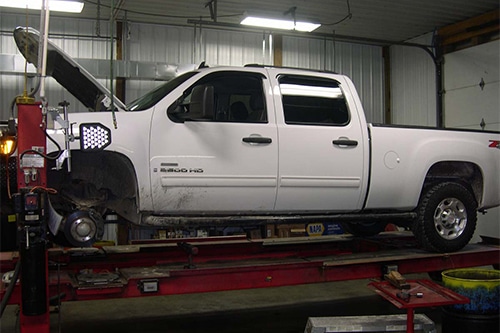
Diesel engines usually last longer than gas engines, so you should clean them more often. During the cleaning process, you could locate an oil or other fluid leak before it gets out of hand. Additionally, dirt and dust get into the engine compartment and build up on the engine, shortening the life of the components. Salt and chemicals from winter roads also corrode the engine and its components faster if you don’t keep it clean.
Check the engine air filter. If the filter is dirty, a diesel truck won’t run well. And, if it’s clogged, a diesel truck may not run at all. In most cases, diesel truck filters should be replaced every 12,000 miles. However, if you drive on a lot of gravel roads or use your diesel truck in the fields, change the air filter every 6,000 to 8,000 miles.
Always make sure you change the oil based on the manufacturer’s recommendations. Most shops replace the oil filter when they change the oil. Dirty oil clogs the engine and can cause it to overheat or shut down.
Every time you get an oil change, you should check the glow plugs to ensure the nuts at the top haven’t backed off. A diesel engine doesn’t use spark plugs – instead, it uses glow plugs to generate heat in the cylinders, as diesel is less volatile than gasoline. If you have a bad glow plug, your diesel truck will most likely not start.
The water separator is a filter that stops water before it contaminates the fuel. Diesel fuel creates condensation, so you need to check the water separator frequently. Most have a screw on the bottom that you can loosen to allow the water to drain. The water separator is usually located near the fuel filter.
Diesel engines usually run hotter than gas engines, which means the radiator is subject to higher temperatures. Flush the antifreeze and replace it with fresh, as recommended by the manufacturer. Antifreeze has properties to keep the engine from freezing in the winter as well as overheating in the summer since antifreeze has a higher boiling point than water. When those chemicals evaporate or are destroyed, the antifreeze will no longer protect your engine. If the engine overheats, it could cause broken head gaskets, warped heads, or complete engine failure for seizing up.
Most diesel engines have two fuel filters – one between the gas tank and the engine and the other between the transfer pump and fuel injectors. Be sure to change both every 10,000 to 15,000 miles, as diesel tends to absorb more condensation than gas.
Add a bottle of diesel treatment every time you fill your tank. The treatment helps keep impurities in the fuel out of the engine. It also has ingredients to help keep diesel fuel from gelling in extremely cold temperatures.
Every time you get an oil change, you should check the belts and hoses. While the number of miles to replacement varies based on how you drive the truck, you can expect to get about 60,000 to 80,000 miles out of them.
Every month, check the tires for proper air pressure. If the air pressure is too low, you could decrease fuel economy. You’ll also wear the tires out much faster. If the air pressure is too high, you’ll wear out the center of the tire tread and have less control over the vehicle. Additionally, balance and rotate the tires at every oil change. They could lose balance weights, and each tire wears differently than the others. Rotating the tires evens the wear on the tread.
Keeping your diesel truck maintenance up to date keeps the engine reliable for hundreds of thousands of miles. When it’s time for diesel truck maintenance, contact Mevert Automotive & Tire Center at (618) 965-9609 for an appointment. We are conveniently located at 1014 West Broadway, Steeleville IL 62288.







Mevert Automotive & Tire Center
Address:
1014 West Broadway, Steeleville, IL 62288
Hours:
Mon – Fri: 8am — 5pm
visibility_offDisable flashes
titleMark headings
settingsBackground Color
zoom_outZoom out
zoom_inZoom in
remove_circle_outlineDecrease font
add_circle_outlineIncrease font
spellcheckReadable font
brightness_highBright contrast
brightness_lowDark contrast
format_underlinedUnderline links
font_downloadMark links